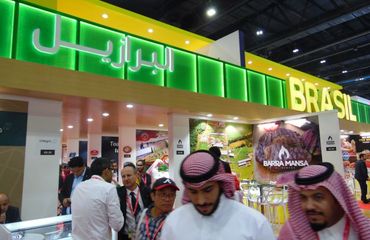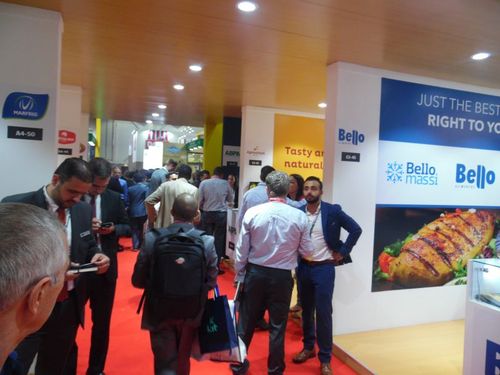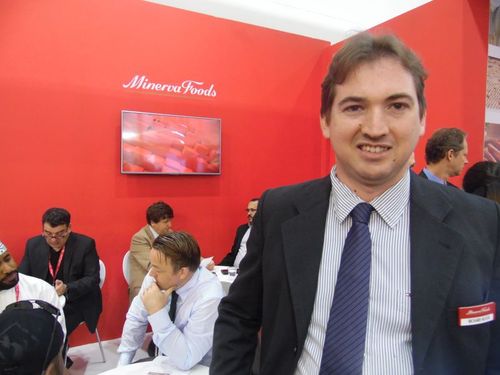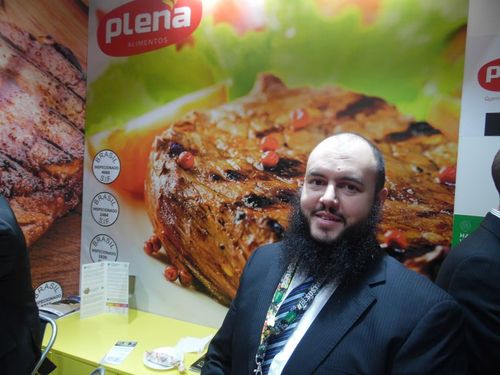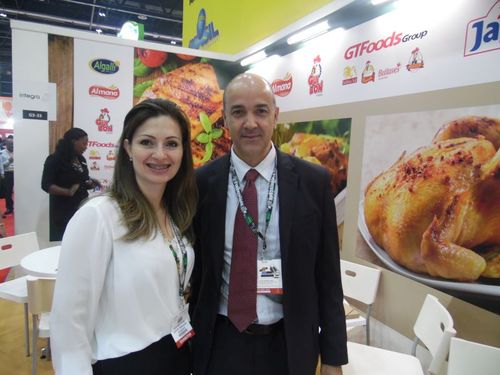<
Dubai – Since they are two of the sectors that most contribute to Brazilian exports to the Arab countries, the beef and poultry processing plants made their presence felt at Gulfood, the sector’s main food and beverages trade expo in the Middle East, which runs until Thursday (22) at the World Trade Centre, in Dubai, United Arab Emirates.
In the exhibition spaces organized by the Brazilian Trade and Investment Promotion Agency (Apex-Brasil) and designated to the member companies of the Brazilian Beef Exporters Association (ABIEC), 19 companies are exhibiting, alongside other 16 member companies of the Brazilian Animal Protein Association (ABPA), making use of a mezzanine where they’re serving barbecue and shawarmas, among other dishes that include Brazilian meat.
Minerva is in another place, in a stand of its own. The company has been attending Gulfood for eleven years, and these years exhibiting apart from Apex’s stands. Although he regrets staying a little too far from the other Brazilian processing plants in this year’s edition, the adviser of industrial operations, Richard Keller, explains their own stand: “We have plants outside Brazil also, such as Argentina, Uruguay, Paraguay, Colombia. It wouldn’t be feasible to have stands for each one of the flags,” he said.
<
The Dubai fair is a priority for the company, which built a strong presence in the Arab countries. “We’re leaders in some of the region’s markets, such as Palestine, Lebanon and Jordan,” said the executive. The stand, which has the same size of last year’s edition, has attracted a large turnout: “Yesterday there wasn’t any place to seat.”
According to Keller, Minerva’s main goal when attending Gulfood is to strengthen the relationship with clients and seek new buyers. “Normally, we finalize sales after the expo,” he said. Salic, a Saudi holding company, is one of the Minerva’s shareholders.
Besides Minerva, JBS also has its own stand at Gulfood. A couple meters from their stand, within ABIEC’s space, Plena Alimentos was searching for Saudi clients. Mohamad Sus, exports manager for the Middle East and North Africa, said that exports by the company from Contagem (Belo Horizonte metro area) to the area began two years ago. “The Saudi market is showing signs of improvement. We had some problems in the past in Egypt, and Algeria is reopening, but we see opportunities also in Jordan, Lebanon and Palestine. Regarding Algeria, there’s a strong possibility of finalizing a deal after the fair,” he explained.
Sus said that the market is a little slower this year because, before the last Ramadan, companies stock reached high levels of stock. The expectation, according to him, is for stocks to run out now and, after the next Ramadan, demand grows again. Ramadan is the month of the Islamic calendar in which Muslims fast during the day, but gather after sunset for group meals.
<
Plena exports fresh products to the Arab market, but also works with processed products. For the latter, demand is high among Africans. “We welcomed some buyers from this market,” said the executive.
Saudi Arabia is also the focus of Agroindustrial Iguatemi. “It’s our major client,” said Douglas Domingues, the company’s exports manager. Near 30% of the output of the meat processing plant from Iguatemi (468 km from Campo Grande) is exported and 25% of this volume goes to the Arab markets. “We sell to the UAE, Egypt, Jordan, but the work done in Saudi Arabia gives us more room there.”
Frigotil is attending Gulfood for the second consecutive year. Sérgio Meirelles, the sales manager of the company from Timon (428 km from São Luís) has never exported to the Arabs. “Last year, I talked to more people in a given day, but half were Chinese and Russian clients, markets in which we’re not interested during the fair. This year, we welcome 15 to 17 people daily, but from the region: buyers from Jordan, Iraq and Iran,” he said.
Poultry
<
While chicken shawarmas are served at the mezzanine, ABPA member companies use their time at Gulfood to seek clients and new deals. Schyene Ritter, import and export manager of Guibon Foods, from Cianorte (508 km from Curitiba), is attending the expo for the eighth time.
“It’s a good opportunity to find clients, not only from here, but also from Europe, to find new deals, see partners again and schedule meetings to talk,” she said. According to her, many important meetings take place during the fair, and since she’s attending, she’s up to date to information that will arrive only later in Brazil.
Guibon exports to many markets worldwide, but the Islamic countries are their main clients. In the Middle East, it sells mainly to Saudi Arabia, UAE and Qatar.
Besides her is Ivan Morais, representative of Jaguá in Dubai, where he’s been living for the past twelve years. “I came for Gulfood 2006 and stayed here,” he said. He said that the fair has grown considerably in this period and that this year’s edition “is very good, as expected, with many opportunities from Middle East and Africa clients.”
Jaguá, from Jaguapitã (442 km from Curitiba), exports for almost all the Middle East countries. The executive mentioned Saudi Arabia, Bahrain, Qatar, UAE and Kuwait as destinations for the company’s poultry.
*Translated by Sérgio Kakitani



